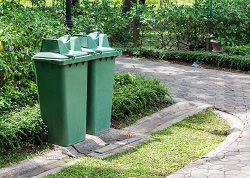Find the nearest e-waste facility for charger recycling
Posted on 18/08/2025
Find the Nearest E-Waste Facility for Charger Recycling: A Comprehensive Guide
In our increasingly digital world, chargers for mobile phones, tablets, and laptops are essential everyday items. However, when these devices cease to work or are replaced, many people are left wondering what to do with their old chargers. Simply tossing them in the trash is not only environmentally harmful, but it's often against local regulations. The best practice? Find the nearest e-waste facility for charger recycling and ensure you're disposing of your electronics responsibly.

Why Is Charger Recycling Important?
Before we dive into how to locate a nearby e-waste facility for recycling chargers, it's crucial to understand why proper disposal is vital. Electronic waste, or e-waste, is one of the fastest-growing waste streams globally. Chargers, though relatively small, contain metals such as copper, aluminum, and sometimes hazardous materials like lead or cadmium. Improper disposal can lead to:
- Soil and water contamination: Toxic elements can leach into soil and water sources, harming ecosystems.
- Health risks: Exposure to hazardous substances in e-waste can pose health threats to humans and animals alike.
- Loss of valuable resources: Chargers contain precious metals that can be recovered and reused, reducing environmental impact and resource extraction.
- Legal repercussions: Many jurisdictions have strict laws regarding e-waste disposal, making proper recycling a legal necessity.
Types of Chargers and Their Environmental Impact
Chargers come in many forms, from traditional USB cables to fast-charging adapters and wireless pads. But regardless of type, all can contribute to e-waste pollution if disposed of improperly.
- Mobile Phone Chargers: Among the most commonly thrown-away electronics, these contain copper wiring, plastics, and small circuit boards.
- Laptop and Tablet Chargers: Heavier-duty and often containing more metal, these charge bricks sometimes have heat-dissipation compounds that require specialized recycling.
- USB Cables: While small, they are often coated in PVC and--like other chargers--use copper wiring inside.
All charger types can--and should--be recycled at certified e-waste facilities.
How to Find the Nearest E-Waste Facility for Charger Recycling
Locating an e-waste recycling center near you doesn't have to be complicated. With technology and growing environmental awareness, numerous resources are available to consumers wishing to dispose of their electronic waste responsibly.
1. Use Online Recycling Locators
The internet is your best friend when trying to find an e-waste collection site for charger disposal near you. Several reputable websites and tools offer directories of recycling facilities nationwide--sometimes even in your neighborhood.
- Earth911: Widely used in the United States and Canada, Earth911 allows users to enter their zip code and the type of item they want to recycle--such as "electronic charger"--to get a list of nearby drop-off options.
- Call2Recycle: Focused primarily on battery and cell phone recycling, Call2Recycle also lists drop-off locations for a variety of e-waste, including chargers.
- Municipal Websites: Your city or local government's website often has an e-waste recycling locator tool or a schedule of upcoming e-waste collection events.
- Google Maps: Simply searching "e-waste recycling center near me" or "charger recycling facility in [city/town]" can yield immediate, location-based results.
Tip: Always check if the location accepts chargers specifically, as some e-waste facilities focus only on large electronics.
2. Check With Electronics Retailers
Many electronics stores and big-box retailers participate in charger recycling programs. Brands like Best Buy, Staples, Office Depot, and even Apple have locations where you can drop off used chargers for proper recycling.
- Best Buy: Most Best Buy stores accept chargers and cables at their customer service desks.
- Staples: Drop off a variety of consumer electronics including adapters, batteries, chargers, and cables for recycling.
- Apple Stores: Bring in any charger or cable (from any manufacturer) to be recycled free of charge.
- Target: Select locations offer e-waste recycling bins for small electronics and chargers near store entrances.
Calling ahead is always a good idea to confirm which items are accepted and if there are any restrictions or limits.
3. Participate in Local Collection Events
Community e-waste events are held regularly in many towns and cities, offering residents a convenient way to dispose of household electronics, including chargers. These events are typically:
- Organized in partnership with recycling companies or non-profits
- Advertised through your town's newsletter, social media pages, or municipal website
- Free or low-cost for residents
These periodic events are perfect for responsibly disposing of small electronics that might not otherwise be accepted at regular recycling centers.
4. Utilize Manufacturer Take-Back Programs
Many electronics manufacturers offer mail-in or in-store take-back programs, allowing customers to ship or drop off their old chargers for recycling.
- Apple: Accepts any brand of charger at their stores or by mail through their recycling program.
- Dell and HP: Provide mail-back options for chargers and other accessories.
- Sony, Samsung, and other major brands: Many offer similar drop-off or return services.
What Happens at a Charger Recycling Facility?
Once you recycle your charger at a certified e-waste facility, what happens next? Understanding the recycling process can give you peace of mind and maybe even motivate you to educate others.
- Sorting: E-waste is separated by type: chargers, cables, batteries, etc. This ensures efficient processing and prevents hazardous mixing.
- Manual Dismantling: Chargers are often disassembled by hand to safely remove any hazardous materials.
- Shredding and Separation: Plastics, metals, and wires go through shredding machines. Advanced equipment separates the materials for recovery.
- Material Recovery: Copper, aluminum, and other valuable metals are extracted and prepared for reuse in manufacturing.
- Safe Disposal: Non-recyclable materials and hazardous substances are handled according to environmental and health regulations.
Why Not Just Throw Chargers in the Trash?
Besides the serious environmental consequences, disposal of chargers and other electronics in regular landfills is illegal in many areas. Many landfills aren't equipped to handle e-waste, meaning harmful chemicals and metals will likely end up polluting soil, water, and air. By choosing an eco-friendly charger recycling center, you're doing your part to protect our planet.
Tips for Preparing Your Charger for Recycling
To make the recycling process smoother and more efficient, keep these tips in mind:
- Remove any personal data: While chargers themselves hold no personal information, if you're recycling devices like power banks or smart cables, check for app connectivity or storage.
- Untangle cables: Separate multiple chargers and cables to facilitate easy processing.
- Bag up small items: Place small charger components in a clear zip-top bag to prevent loss during transportation.
- Do not include batteries unless accepted: Batteries require different recycling processes; only include them if the facility specifically accepts them.
- Wipe down dirty items: Clean off excessive dirt or debris for easier handling.
Additional E-Waste Recycling Resources
If you want to learn more about e-waste recycling, responsible electronics disposal, and sustainability tips, here are some reputable resources:
- U.S. Environmental Protection Agency: Electronics Donation & Recycling
- Call2Recycle Official Website
- Recycling Locator.org (UK)
- RecycleNation

Frequently Asked Questions About Charger Recycling
Q: Can I recycle damaged or broken chargers?
Yes! Most certified e-waste facilities are equipped to handle all types of chargers, regardless of their working condition.
Q: Are there any charges or fees for recycling old chargers?
Many facilities and retailer programs are free for small electronic items like chargers, but some may charge a nominal fee for large drop-offs or certain hazardous components. Always double-check with the location beforehand.
Q: What about counterfeit or unbranded chargers?
All brands and types of chargers--including generic or unbranded--can typically be recycled at legitimate e-waste centers.
Q: Can chargers be recycled through my curbside recycling program?
Most curbside recycling programs do not accept electronic waste. Chargers require special handling at dedicated facilities.
Conclusion: Take Action to Recycle Your Chargers Responsibly
As technology evolves, so does our responsibility to manage our electronic waste wisely. Finding the nearest e-waste facility for charger recycling is a simple but impactful way to protect the environment and conserve valuable resources. With countless recycling options for electronic chargers available--from local facilities to retailer programs and community collection events--it's never been easier to do your part.
Ready to get started? Use the online tools mentioned above, contact your local shops, and make a habit of recycling old chargers and cables. By spreading the word and taking decisive action, we can all help reduce the impact of e-waste for a cleaner, greener planet.
Remember: It starts with one charger--but together, our collective efforts add up to meaningful change!
Latest Posts
Key Strategies for Effective Skip Hire Management
Unveiling the Plastics You Should Reconsider Using
Navigating the World of Hazardous Waste: What Qualifies as Dangerous

 020 3859 5580
020 3859 5580 020 3859 5580
020 3859 5580





 House Clearance
House Clearance Rubbish Collection
Rubbish Collection House clearance in London has never been easier, as Junk Removal Services can take care of your every need. From individual house junk...
House clearance in London has never been easier, as Junk Removal Services can take care of your every need. From individual house junk... With Junk Removal Services you can be confident that you’ll receive the most professional and affordable rubbish collection service within the London...
With Junk Removal Services you can be confident that you’ll receive the most professional and affordable rubbish collection service within the London...





